Decolonise your shelf: 12 books by First Nations authors
Support First Nations authors this National NAIDOC Week.
Hello! I’m Celine and I write about books, cooking, gardening and surviving life in the city, when you have a wild heart. Subscribe for free posts like this one, or join the community for other exclusive writing. Either way, thanks for your support!
Here in Australia, the first full week of July is known as National NAIDOC Week (7-14 July this year). The week long celebration is intended as an opportunity to learn about Australia’s First Nation peoples’ culture and history – just casually, the oldest living culture on the planet.
And what better way to do so, than through books?
Much of the best and most awarded writing coming out of Australia is by First Nations authors. From sweeping epics to family sagas, and small packets of poetry with eye-catching covers, there’s plenty of titles to choose from.
I’ve rounded up 12 of my own favourites, to share with you.
Terra Nullius by Claire G. Coleman
‘Terra nullius’ is an old legal concept, which can translate to mean ‘no man’s land’. This term was applied to the land mass now known as Australia by the British when they invaded, conveniently ignoring the fact that the continent was already very much inhabited at the time.
History lesson aside, Noongar woman Claire G. Coleman’s fiction debut takes this concept and complete turns it on its head.
We read extracts from an archive, with letters home from ‘settlers’ and government memos, stating that there are issues ‘saving’ the ‘natives’.
From the pages emerges Jacky, a ‘Native’ slave on the run. Taken from his family at a young age, he has no memory of home, and as he navigates across the country on foot, he links all the other characters together.
I don’t want to say anymore, as this dystopian setting features a reveal around Chapter 10 that completely upends the story.
Too Much Lip by Melissa Lucashenko
An acclaimed Aboriginal writer of Goorie and European heritage, Melissa Lucashenko’s oeuvre is so strong (a common problem on this list), that it’s hard to pick which book to begin with. The Miles Franklin Award-winning Too Much Lip isn’t a bad place to start.
The story is set in the fictional Australian town of Durrongo. We’re introduced to fast-talking Kerry Salter, as she rips through town on a ‘borrowed’ Harley – returning to the place she once escaped. What’s drawn her back? The impending death of feared and respected family patriarch, Pop Owen. And so begins a darkly comedic family saga, featuring a motley crew of down-on-their-luck characters, who band together to take on Jim Buckley, both a real estate agent and the mayor of the nearby town of Patterson, who wants to build on land that has cultural significance to the Salters.
While Too Much Lip is genuinely funny, it grapples with substance abuse, racism, poverty, displacement and generational trauma. Big themes, deftly handled by a writer at the top of their game.
The Yield by Tara June Winch
Within the pages of The Yield by Wiradjuri author Tara June Winch, we meet 30-something August, as she returns home from overseas, for the funeral of her grandfather, Albert ‘Poppy’ Gondiwindi.
The novel is told from the perspective of Poppy (through excerpts of his Wiradjuri-language dictionary), August, and a 19th-century missionary, Reverend Greenleaf (through his letters and diaries).
With her family home about to be demolished for of all things, a tin mine, she is attempting to find the dictionary that Poppy was writing before he died (language being one of the many things fractured by colonisation), which just might be key to saving her land.
Winning just about every award under the sun, The Yield is a worthy addition to the growing collection of First Nations literary fiction.
Dropbear by Evelyn Araluen
For something completely different, how about a book of poetry?
Dropbear by Bunjalung poet Evelyn Araluen takes on the traditions of Australia’s colonial culture and literary history. The title itself refers to a hoax played on tourists and backpackers, which depicts the relatively benign and lazy koala bear as a fiercesome carnivore, dropping viciously from the trees, out for blood.
In turn, Dropbear uses a variety of poetic forms to upend the history, myths and stereotypes that apply to First Nations people.
I haven’t really studied poetry since high school English and while I enjoy it, don’t read as much as I should. So, in turn, I’m encouraging you to seek out this collection of poetry, which manages to both celebrate and condemn Australia with the most beautifully crafted poetic punches.
The White Girl by Tony Birch
The White Girl introduces us to Odette Brown and her granddaughter Sissy, who Odette is raising in the fictional country town of Deane.
It’s the 1960s in Australia and the ‘Aborigines Protection Act’ is in full force. Children are still being forcibly taken from their parents, caregivers and local communities, the shock waves of which will reverberate throughout future generations.
The problem is, that while Sissy is of First Nations descent, she ‘passes’ as white. Bill Shea, the local policeman, the ‘protector’ of the community, largely leaves Odette and Sissy alone, but he is replaced by Sargeant Lowe, a total jobsworth and bigot, who is determined to enact total control over his new jurisdiction.
And then, the plot thickens – Odette is sick and needs to journey to the city for treatment. Under law, she requires a ‘travel certificate’ issued by Lowe to leave.
However, she cannot go without Sissy, for fears that Lowe will swoop in and take her, believing he is doing ‘the right thing’ and in doing so, displace yet another Indigenous child.
So, Bill Shea and Odette hatch a plan, to sneak Sissy out of the town, leaving Lowe furious in their wake. And the chase begins…
Tracker by Alexis Wright
If you’re in the mood for an epic, you’d best turn to the works of Waanyi writer Alexis Wright. Tracker is a work of non-fiction, covering the life of Aboriginal leader Tracker Tilmouth, who died in 2015 at the age of 62.
Tracker is a collective memoir, drawing on interviews and stories from dozens of people, weaving them together to paint the picture of a man who was larger than life. A determined advocate for the economic, social and legal advancement of Aboriginal Australians, Tracker’s story is not told from Wright’s perspective, rather those of friends, colleagues, family, and that of the man himself.
It’s not a small book by any means and one that requires careful attention. Wright won the Stella Prize in 2018 for her efforts (and would go on to win again in 2024 for Praiseworthy).
Taboo by Kim Scott
Kim Scott is a descendant of the Wirlomin Noongar people and Taboo is one of his most haunting novels.
In rural South-Western Australia, a group of Noongar people visit a ‘taboo’ place, the site of a tragic massacre. Now, the elderly owner of the farm hopes that by hosting the group, he will cleanse the land of the stain that has hovered over it for generations.
With them comes Tilly, who having experienced abuse at the hands of white people, hopes to connect to the old ways and her own cultural identity.
Scott is a pro at exploring how language connects us to place and his writing is indeed beautiful to read.
Sand Talk: How Indigenous Thinking Can Save the World by Tyson Yunkaporta
I first read Sand Talk in 2020, shortly after it was published. At the time, there was a lot of discussion taking place regarding the horrific bushfires here in Australia; of how the traditional fire management system of First Nations communities could protect the country from a repeat of the summer of 2019/2020.
Personally, I think yeah – those who have managed this land for tens of thousands of years could probably do a better job of mitigating environmental threats than those who have lived here for a mere 230-odd years.
Tyson Yunkaporta’s book takes this thinking a step further, examining how Indigenous Australian culture can help heal the world.
Yunkaporta draws deep on First Nations traditions and his own personal insight, to offer up techniques to the reader on how they can best live and learn, as they walk the path of life.
While the writing is accessible, there are many challenging ideas in this, merely because they go against the grain of how many of us fundamentally see the world and our place within it.
It’s a book I’ll certainly come back to again and again – plainly told, with plenty of heart and a powerful insight into this land’s deep and ancient culture.
Ghost Bird by Lisa Fuller
Wuilli Wuilli woman Lisa Fuller’s debut book Ghost Bird is truly, out of this world.
This is a dark story, with multiple layers and depth – there’s mystery, horror, ‘casual’ (and not so casual) racism and a deep examination into Aboriginal culture and spirituality. Truly a lot happening at once, but somehow it works.
Stacey and Laney Thompson are identical ‘mirror’ twins; sisters and friends. Set in the nineties, the teenagers are growing up in the small rural town of Eidsvold in Queensland, where there is a clear division between First Australians and the settler population.
Stacey is sensible and Laney is a bit on the wild side, so Stacey is cheesed off when her twin starts fraternising with local boy Troy.
Then, one night Laney disappears, presumed to have run away. Stacey begins to dream of a young woman, trapped, frightened and hunted. It is thought that Laney has disobeyed cultural lore and entered forbidden lands.
I’ll stop there, because I don’t want to ruin anything but just – woah. My final word of warning is to try to avoid reading this book alone at night.
Dark Emu by Bruce Pascoe
Dark Emu is probably one of the most controversial books to be published in Australia, ever. To the point where people are still discussing and getting enraged about it, a decade on.
While met with critical acclaim and awarded the country’s top literary prizes, it has also ignited fierce debates over its historical accuracy, and author Bruce Pascoe’s own Aboriginal heritage.
Dark Emu argues against a very particular narrative in Australia – stating that the country’s First Nations peoples were not in fact, nomadic hunter gatherers, but had permanent settlements, tools, technology and agricultural practices.
Pascoe drew from the diaries of early British settlers to make his argument, whose own writings show that Australia’s Aboriginal people were very much an agricultural society; meaning they were very much in-tune and connected to Country, maintaining a symbiotic relationship with the land, that those who invaded and violently colonised it have been unable to replicate.
Although it draws from research, academic writing and scholarship, this is an entirely accessible book, written in Pascoe’s trademark conversational tone. It’s absolutely a book that every Australian should read, no matter what their heritage and cultural background.
For more, I recently read and wrote a review for Pascoe’s follow up book, Black Duck: A Year at Yumburra.
Throat by Ellen van Neerven
Another book of poetry to add to the list.
Throat, by Ellen van Neerven, a writer and poet of Mununjali Yugambeh and Dutch heritage, is a hard one to describe; transcending genres, interweaving the personal and political.
A slim collection which you can easily devour in one sitting, but is sure to sit with you for long after.
Welcome to Country by Marcia Langton
We’ll round out this list with one of my absolute favourites, by powerhouse Professor Marcia Langton AO.
Welcome to Country (now in its second edition) is a travel guide to Indigenous Australia and the Torres Strait Islands. It offers insight into Australian history and culture from a First Nations perspective, alongside proper etiquette for visitors (and probably something worth revisiting for those of us who live here, too).
The guide also has a full range of First Nations-owned and/or -operated tourism experiences across the country – important information, to ensure that your hard-earned dollars are going towards legitimate Indigenous businesses.
Beautifully packaged, it also makes for an excellent coffee table book, if that’s your thing.
If you’re after more, the First Knowledges series is also worth a peruse.
Thanks for reading and hopefully there’s something on this list that sparks intrigue. I missed Thursday’s publication date due to illness and didn’t fancy sending out another missive like the one from last time I was unwell.
Between sickness and a very rapid move of residence, it’s been a bit of a bumpy winter so far. I know I’m looking forward to getting back to regular programming (and a quieter life) next week. No more book lists for a bit – instead I have a travel and food mishmash coming up next, based in Tasmania.
‘Til then, stay well and well-fed.
-Celine
If you enjoyed this post, you may also like:
10 easy and sometimes emotional page turners
A note on First Nations vocabulary: Language is important. As a non-Indigenous writer, and given the diversity of Aboriginal and Torres Strait Islander groups within Australia, I have respectfully used the term ‘First Nations’ when referring to First Australian people, unless Indigenous Australians is a better fit. Language is always evolving and the Australian Government Style Manual is worth consulting for the most correct and respectful language usage.
Most links in this missive will take you to YourBookstore.io. This very handy website allows you to shop and support independent Australian bookstores. Give your local some love, or request a copy from your nearest library.

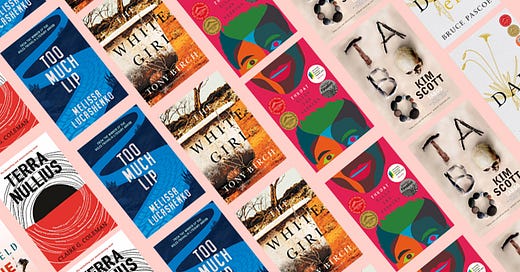


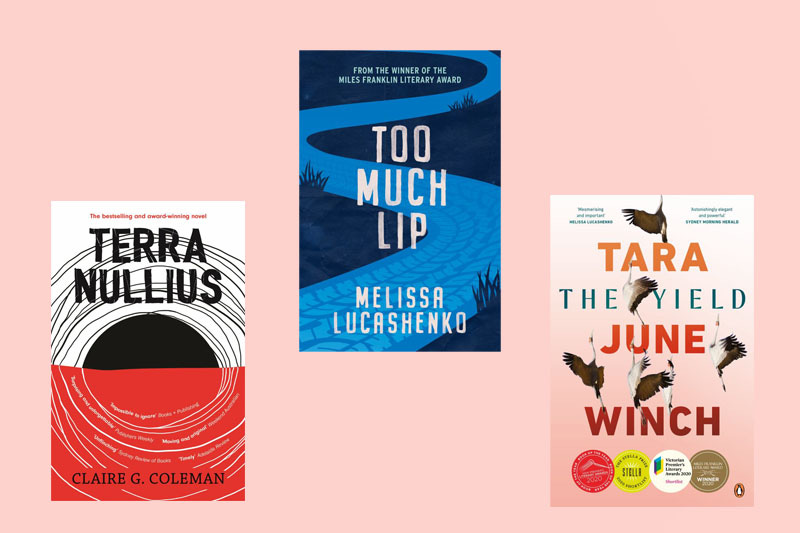
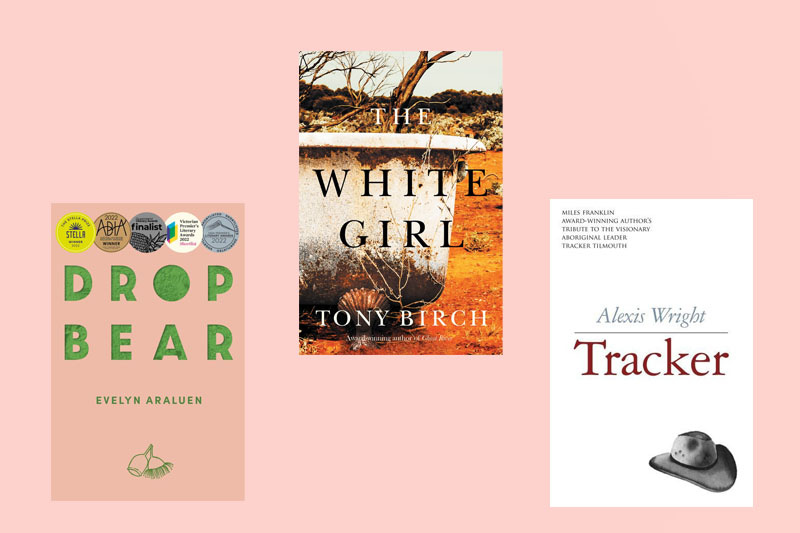
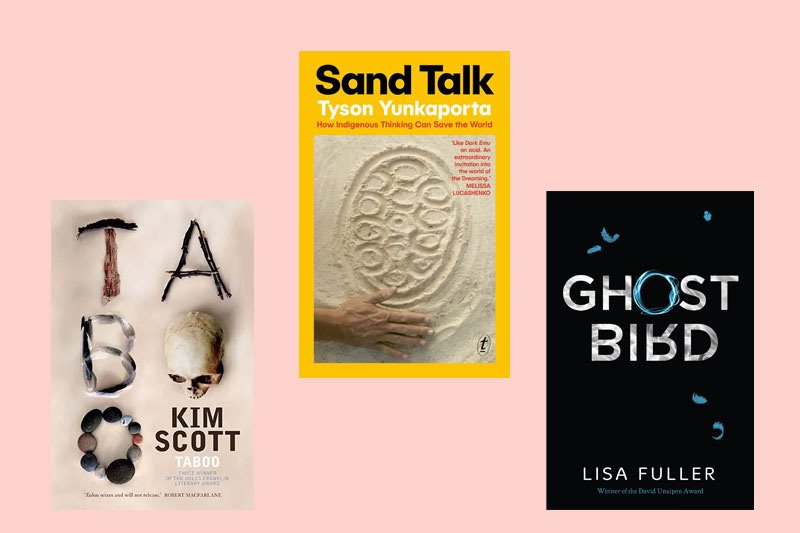
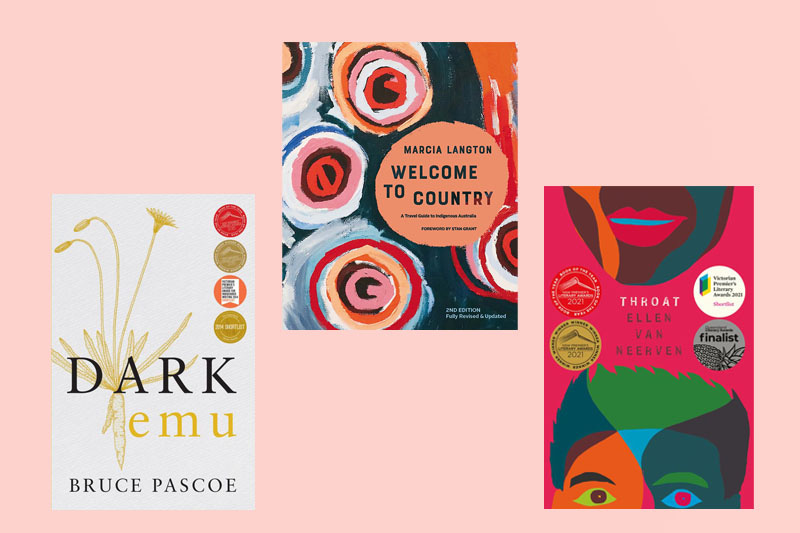
This is such a beautiful list, thank you! So many added to my 'want to read'!
Wonderful write-up! I've only read a little of Welcome to Country and need to dive further into it, such a great concept for a book.